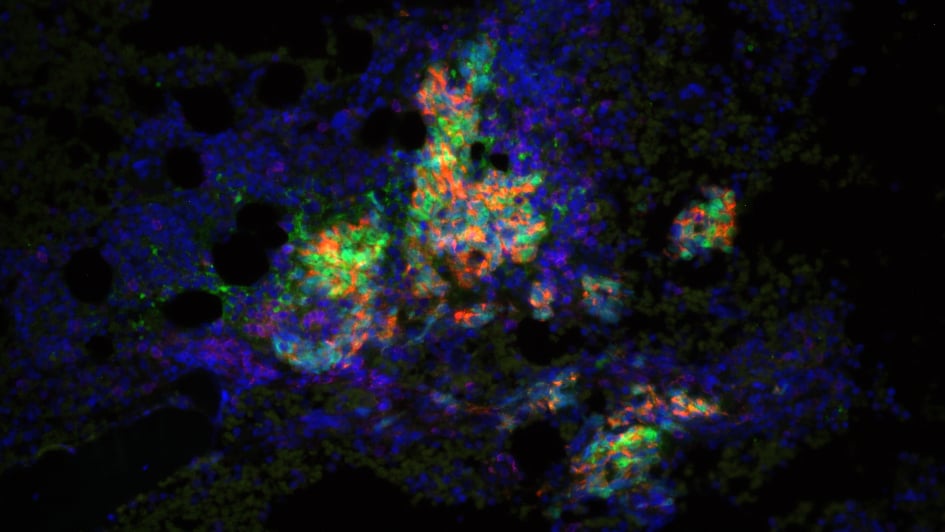
Image: Prostate cancer cells. Credit: Johann de Bono and Mateus Crespo, ICR
Drugs that can ‘reprogramme’ immune cells from protecting cancer to attacking it could be an effective new treatment for some men with advanced prostate cancer, a new study shows.
Researchers found that immune cells called macrophages, already drawn into prostate cancer tumours to help promote growth, can be targeted and rewired to attack the disease.
In studies of cancer cells and mice with prostate cancer a so-called CXCR2 inhibitor, which blocks a protein receptor on macrophages, inhibited tumour growth by switching them from helping the tumour to triggering anti-tumour immune responses instead.
The drug, called AZD5069, is now being studied in a clinical trial led by researchers at The Institute of Cancer Research and our partner hospital The Royal Marsden NHS Foundation Trust, to test its effectiveness in men with advanced prostate cancer.
The new research, published in the journal published in the journal Cell Reports, was carried out by a European group of researchers led by the Istituto Clinico Humanitas in Milan, Italy, the Institute of Oncology Research in Switzerland, and in the UK by the ICR and The Royal Marsden.
Reprogramming immune cells to treat prostate cancer
Cancer cells are able to hide from the body’s immune system by manipulating their environments to help their growth, and one way they can do this is by recruiting macrophages.
Macrophages are white blood cells that play an important role in the immune system helping to protect the body, removing unwanted microbes and other ‘foreign’ bodies including cancer cells. But in prostate and some other cancers, they can be induced to protect the tumour instead of attacking it.
The new study showed that in some prostate cancers, these tumour-associated macrophages express a protein called CXCR2, which triggers immune responses that can protect tumours and help them grow.
In studies of cancer cells, researchers saw that CXCR2-expressing macrophages infiltrate prostate cancer and sustain tumour growth.
Higher levels of infiltration were associated with more aggressive cancer and worse outcomes for patients with the disease.
We are building a new state-of-the-art drug discovery centre to create more and better drugs for cancer patients. The centre is a £75m project – and we now have less than £2m to raise. Help us finish and equip the building to get our research off to the best possible start.
Find out more
Reversing a survival mechanism for prostate cancer
The researchers showed that the CXCR2 antagonist AZD5069 reduced tumour growth in mice with prostate tumours, compared with untreated mice.
The drug reduced anti-inflammatory signals that benefit cancer cells and switched the immune cells to promote inflammation and trigger cell death – reversing an important survival mechanism for prostate cancer.
The researchers were looking in prostate cancer tumours missing a key tumour suppressing gene called PTEN, which is missing or mutated in about half of men with the disease. CXCR2-inhibiting drugs could be a future option for some of these men.
The research was largely funded by the European Research Council, with additional support from funders including the Josef Steiner Foundation.
Professor Johann de Bono, who is leading the clinical trial at the ICR and The Royal Marsden, said:
“Prostate cancer tumours can suck in white blood cells that actually protect them from our immune system, and to help them grow. Re-training these tumour-associated macrophages to target the disease could help treat aggressive prostate cancer.
“This study shows firstly that a receptor on white blood cells called CXCR2 gives tumour-associated macrophages pro-cancer characteristics in prostate cancer – and secondly, that by blocking this receptor can reverse this process in mice and actually turn the macrophages against the disease.
“We are now running a clinical trial to study the effects of CXCR2 inhibition in patients with advanced prostate cancer.”